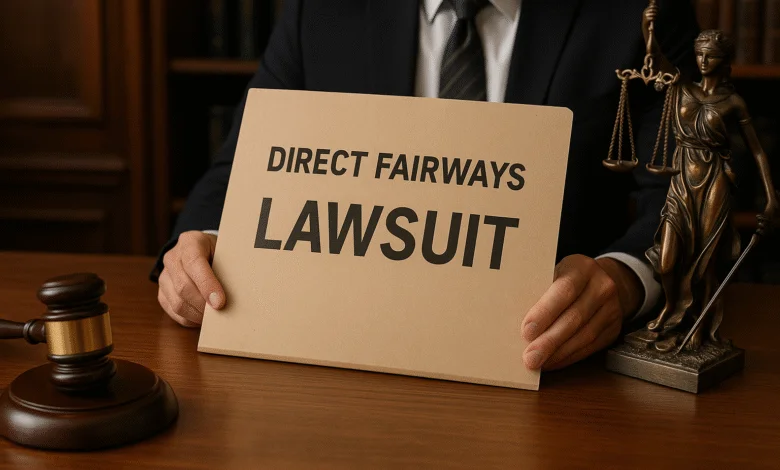The Truth Behind the Direct Fairways Lawsuit: What Really Happened and Why It Matters

Introduction: Understanding the Direct Fairways Controversy
In the world of golf marketing and business networking, few names have sparked as much conversation as Direct Fairways Lawsuit. Known for connecting golf enthusiasts, local businesses, and country clubs through innovative advertising strategies, the company once seemed like a dream come true for small business owners looking to expand their reach. However, in recent years, that dream has been clouded by legal troubles and controversies that culminated in what’s now widely known as the Direct Fairways lawsuit.
The lawsuit brought attention to the company’s business practices, raising questions about transparency, ethics, and customer satisfaction. For many, it was a wake-up call about how aggressive marketing models can blur the lines between smart sales tactics and deceptive practices. While Direct Fairways had a strong presence in golf-related advertising, the complaints that surfaced against them painted a very different picture.
To truly understand the Direct Fairways lawsuit, it’s important to look beyond the headlines and into the details — who was involved, what the allegations were, and what the case means for both consumers and the marketing industry as a whole.
Who Is Direct Fairways? A Look at the Company and Its Business Model

Direct Fairways Lawsuit built its reputation as a marketing agency that catered primarily to the golf industry. The company offered advertising opportunities for small and medium-sized businesses through golf-related materials including scorecards, yardage books, tee signs, and event sponsorships. The idea was simple yet powerful: connect businesses with a targeted, affluent audience of golf players across the United States.
On paper, the concept seemed brilliant. Local businesses such as restaurants, car dealerships, insurance agents, and real estate professionals could pay to have their logos and contact information displayed at golf courses. This kind of advertising promised both visibility and credibility, especially in communities where golf played a central role in social life.
However, over time, complaints started surfacing. Many customers claimed they had been misled about the scope of their advertising deals or about the return on investment they could expect. Some even alleged thatDirect Fairways Lawsuit failed to deliver the promised services altogether. These claims slowly piled up, leading to increasing scrutiny from customers and consumer protection agencies alike.
The Lawsuit: What Triggered the Legal Battle
The Direct Fairways lawsuit didn’t appear out of nowhere. It was the culmination of numerous complaints and allegations that spanned several years. According to reports, the company was accused of engaging in misleading sales practices and misrepresentation of its advertising products. Some customers claimed they were pressured into signing contracts they didn’t fully understand, while others said they never received the products or services they paid for.
The allegations painted a troubling picture of how the company conducted business. In many cases, business owners were approached by sales representatives who made bold promises about exposure, traffic, and sales growth. However, when the actual results failed to meet expectations, these same clients found it difficult to get refunds or even a proper response from the company.
The lawsuit essentially centered on the idea that Direct Fairways had violated consumer protection laws by misleading clients and failing to deliver as promised. While the company maintained that it was offering legitimate advertising opportunities and that misunderstandings were isolated incidents, the mounting evidence suggested otherwise. This legal battle not only affected Direct Fairways Lawsuit’ reputation but also raised broader questions about ethical business practices in the marketing world.
Customer Complaints and Real Experiences
Behind every lawsuit, there are real people and in this case, many small business owners felt they were taken advantage of. Online forums, consumer review sites, and Better Business Bureau (BBB) reports were filled with customer stories expressing frustration over the company’s unfulfilled promises.
Some clients claimed that after paying thousands of dollars for advertising packages, they received little to no follow-up communication. Others said the products they were promised — such as golf course signage or printed materials either arrived late, contained errors, or never showed up at all. For small businesses operating on tight budgets, these losses were more than just financial; they represented lost trust and wasted opportunities.
A recurring theme in these complaints was the alleged aggressiveness of the company’s sales team. Customers described being contacted repeatedly, pressured to make quick decisions, or being told that only “limited spots” were available at specific golf courses. Such tactics, if true, could easily cross the line between persuasive selling and unethical manipulation.
Legal Proceedings and Outcomes
While details of specific legal proceedings vary, the lawsuit against Direct Fairways Lawsuit highlighted several important legal concepts particularly those related to consumer protection, false advertising, and contractual obligations. Depending on the jurisdiction, the company faced both civil complaints and administrative investigations that examined whether their business model violated local laws.
In some cases, settlements were reached, allowing affected customers to recover a portion of their losses. However, like many corporate lawsuits, the resolution was far from simple. Legal experts noted that such cases often take years to resolve, and outcomes can differ widely depending on evidence, witness testimony, and the company’s willingness to cooperate.
The broader impact, however, was clear. The lawsuit tarnished the company’s reputation, leading to greater skepticism from potential clients. It also served as a warning to other marketing firms about the importance of transparency and accountability in their dealings with customers.
The Broader Implications for the Marketing Industry
The Direct Fairways lawsuit wasn’t just a story about one company it was a reflection of a much larger issue in the marketing industry. As digital and print advertising models evolve, many companies are under pressure to deliver measurable results to their clients. Unfortunately, this pressure sometimes leads to exaggerated claims or overly aggressive sales tactics that can border on deception.
The lawsuit reminded the industry that ethics matter as much as creativity. In an era where customer reviews and online transparency can make or break a business, honesty in sales and advertising is no longer optional it’s essential. Companies must ensure that their sales representatives are properly trained, that contracts are clear and fair, and that clients fully understand what they are paying for.
Additionally, the Direct Fairways Lawsuit case highlighted the need for regulatory oversight. Agencies that monitor advertising practices can help prevent such disputes before they escalate into lawsuits. Clearer industry standards could also help protect small businesses from being misled by overly optimistic marketing pitches.
How Businesses Can Protect Themselves
For small businesses and entrepreneurs, the Direct Fairways lawsuit offers some valuable lessons. The first and most important takeaway is to always do your research before signing any contract or making a payment. Verify the company’s credentials, read reviews from other clients, and make sure that all promises are clearly outlined in writing.
It’s also wise to be cautious of high-pressure sales tactics. Legitimate companies will allow you time to review proposals and think things over before committing. If a salesperson insists that you make an immediate decision or offers a “too good to be true” deal, it’s usually a red flag.
Lastly, businesses should keep records of all communication including emails, invoices, and phone calls in case they need to dispute a charge or claim later. Having documentation is often the difference between winning and losing a case if things go wrong.
Conclusion: Lessons from the Direct Fairways Lawsuit
The story of the Direct Fairways lawsuit serves as a cautionary tale in today’s fast-paced marketing environment. While the company’s original idea helping local businesses gain exposure through golf-related advertising was innovative, the execution and ethics behind it ultimately came under fire. The resulting legal battles and customer backlash underscore how critical trust, transparency, and accountability are in business.
For consumers and companies alike, this case is a reminder that due diligence is essential. Marketing partnerships should always be built on clear expectations, honest communication, and mutual respect. The Direct Fairways Lawsuit controversy may fade with time, but its lessons will continue to resonate in the marketing world for years to come.
At the end of the day, the best marketing strategy isn’t just about visibility it’s about credibility. And once that’s lost, even the biggest advertising budget can’t buy it back.



